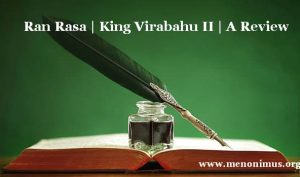Ran Rasa | King Virabahu II | A Review

Ran Rasa by King Virabahu II-A Review
Introduction:
‘Ran Rasa’ is a remarkable epic composed by King Virabahu II, which vividly celebrates the historical victory of King Dutugemunu over King Elara, leading to the unification of Sri Lanka under a single ruler. The epic delves into the triumphant exploits of Dutugemunu, intertwining history, culture, and valor into a tapestry of poetic brilliance.
Historical Significance:
The epic ‘Ran Rasa’ holds immense historical significance as it immortalizes the pivotal moment in Sri Lanka’s history when King Dutugemunu, driven by a fervent desire to free his land from foreign rule, successfully defeated the oppressive King Elara. This unification marked a turning point, shaping the socio-political landscape of the island nation for centuries to come. King Virabahu II’s portrayal of this event allows readers to connect with their heritage and gain insights into the country’s rich past.
Narrative Depth and Structure:
The narrative structure of ‘Ran Rasa’ is carefully crafted to engage readers while staying true to historical events. The epic starts with an evocative portrayal of the societal backdrop, setting the stage for Dutugemunu’s ascension and his subsequent struggle against Elara. The storyline is richly layered with intricate details, weaving together battles, alliances, sacrifices, and personal motivations. This complexity imparts a sense of authenticity and depth to the narrative.
Poetic Excellence:
King Virabahu II’s mastery of language and poetic form is evident throughout ‘Ran Rasa.’ His use of vivid imagery, metaphors, and symbolism not only paints a visual picture but also evokes deep emotions. The poetic descriptions of battle scenes, landscapes, and character traits allow readers to immerse themselves fully in the world of the epic. The rhythmic flow of the verses contributes to the epic’s captivating nature.
Characterization:
The characters in ‘Ran Rasa’ are portrayed with remarkable depth and nuance. King Dutugemunu’s determination, courage, and strategic brilliance are showcased, making him a heroic figure worthy of admiration. King Elara, while an antagonist, is not depicted as a one-dimensional villain; his motivations and perspective add complexity to the conflict. Secondary characters, such as loyal generals and advisers, also contribute to the epic’s richness.
Cultural Reflections:
Beyond the historical and narrative aspects, ‘Ran Rasa’ offers insights into the cultural ethos of ancient Sri Lanka. The epic delves into religious beliefs, societal norms, and the significance of unity in the face of adversity. Rituals, customs, and values are interwoven seamlessly into the narrative, providing readers with a holistic understanding of the era.
Timeless Themes:
The themes explored in ‘Ran Rasa’ remain relevant across generations. Themes of valor, patriotism, leadership, and the struggle for freedom resonate with readers irrespective of their time and place. The epic’s emphasis on the consequences of unity, as well as the ethical implications of war, provoke contemplation on perennial moral dilemmas.
Conclusion:
‘Ran Rasa’ is not merely a historical account; it is a lyrical testament to the resilience of a nation and its people. King Virabahu II’s poetic brilliance elevates this epic beyond a simple retelling of events, transforming it into a timeless work of art that pays homage to the past while inspiring the present and future. This literary masterpiece stands as a reminder of the power of language to transcend time and connect generations through shared stories and values. 0 0 0.
Ran Rasa King Virabahu II A Review
N.B. The article originally belongs to the book entitled ‘The Reviews of Epic Literature Around the World’ by Menonim Menonimus.
You May Like:










